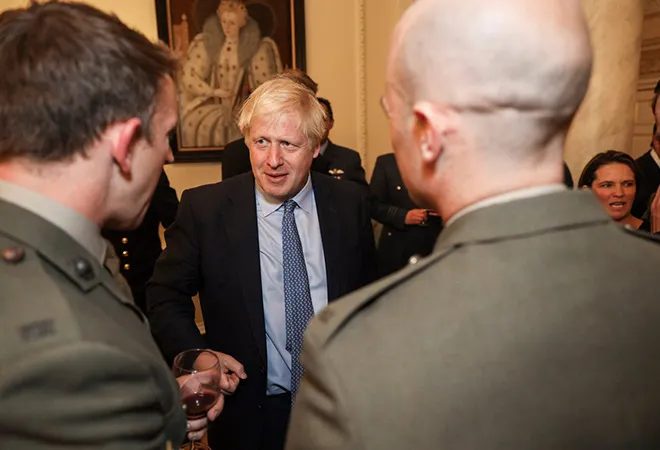-
CENTRES
Progammes & Centres
Location
British polity is undergoing a churn unlike any in recent history and it will end up reshaping the nation’s political texture. Whether British politicians are ready for this change is a different matter altogether.

British Prime Minister Boris Johnson is in trouble. He knows it and he is trying his best to make the best out a very difficult situation in which he finds himself, largely due to his own making. Though he managed to get the backing of United States President Donald Trump during his brief trip to New York for the United Nations General Assembly session recently, Johnson’s political position in the United Kingdom is becoming ever more tenuous.
Johnson is trying to project an image of a defiant leader brushing off cries of ‘Resign!’ emanating from various quarters and daring his foes to try to topple him in and outside Parliament. He has lost seven votes out of eight held in the House of Commons since he became Prime Minister, the latest being a vote on motion asking the Commons to adjourn for three days for the Conservative Party to hold its annual party conference. Such are the dividing lines in the British Parliament these days that no side is willing to cede an inch.
The Supreme Court of the United Kingdom in a major ruling on September 24 made it clear that the PM’s suspension of Parliament was void and his advice to the Queen unlawful, underlining that it was impossible to conclude there had been any reason — “let alone a good reason” — to advise the Queen to prorogue Parliament for five weeks in the run-up to the Brexit deadline of October 31.
Johnson had insisted that the suspension of Parliament had been necessary in order for him to bring forward a Queen's Speech on 14 October outlining his government's policies. However, the court concluded that the effect of such a move was to stop parliamentarians from scrutinising the government. Johnson, who was in New York when the ruling came, has said he “profoundly disagrees” with the decision of the court, but he would respect it. His Attorney General Geoffrey Cox too maintained that he respected the decision even as he targeted those who have been resisting calls for an election, calling them “too cowardly” and suggesting that “this Parliament is dead.”
In the House of Commons, Johnson asserted that the Supreme Court was "wrong to pronounce on a political question at a time of great national controversy.” Then he went on to ask smaller parties to table a vote of no confidence in his government to trigger a general election — something he has long desired.
The Labour Party and the Scottish Nationalist Party (SNP), however, are refusing to take the bait and remain unwilling to vote for a general election until a no-deal Brexit has been taken off the table. Johnson’s entire plan was premised on the Labour Party agreeing to go in for an election but Labour leader Jeremy Corbyn has been denying the Prime Minister the two-thirds parliamentary majority required for an election to take place as per law. Arguing that it might be the only way of avoiding a no-deal Brexit, the SNP is pushing for a vote of no confidence in the government to replace Johnson as Prime Minister and backing Jeremy Corbyn as a ‘caretaker’ Prime Minister. Corbyn too has suggested that the prospect of an emergency government was becoming “more likely every day”.
So Johnson is stuck in a labyrinth of his own making. Though he has tried his best to project himself as trying to deliver on the people’s mandate on Brexit, the deadlock he faces in Parliament is all too real. He has tweaked all the rules he possibly can, but he has found no way out so far.
For the European Union, this is a crisis which it cannot ignore. Yet this is also a crisis which it doesn’t want to get too involved in. It is, after all, a domestic political crisis of Britain. It wants negotiations to deliver a Brexit deal and for better or worse, the only negotiating authority they have is the Johnson government.
In fact, there is a bigger challenge that whichever deal might be agreed upon, it might not find enough backers in the British Parliament. For all the hullaballoo Johnson and his shenanigans have generated, on the ground things stand where they were two months back when Johnson had taken over from Theresa May. There were not enough votes in Parliament to either pass a deal or leave the EU without a deal or even trigger early election. This is a conundrum to which neither Johnson nor his detractors have any answer.
British polity is undergoing a churn unlike any in recent history and it will end up reshaping the nation’s political texture. Whether British politicians are ready for this change is a different matter altogether.
This commentary originally appeared in Money Control.
The views expressed above belong to the author(s). ORF research and analyses now available on Telegram! Click here to access our curated content — blogs, longforms and interviews.

Professor Harsh V. Pant is Vice President – Studies and Foreign Policy at Observer Research Foundation, New Delhi. He is a Professor of International Relations ...
Read More +